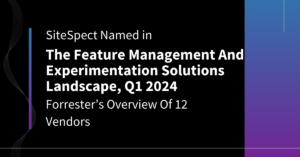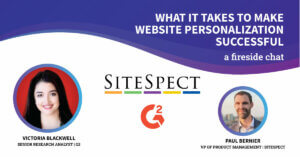The Future of Marketing: What to Expect in a Cookie-less World
By Kevin Plankey
July 15, 2021
Share
With third-party cookies on their way out, marketers everywhere are having to rework their data strategies. From browser tracking protections like Safari ITP and Mozilla Firefox ETP to Google’s upcoming move to Federated Learning of Cohorts (FLoC), the increasing number of data privacy regulations can feel overwhelming. However, the end of third-party data really presents a new opportunity for marketers to collect data in a more meaningful way and respect user privacy above all else.
Rather than collecting user data from cookies set in a user’s browser, marketers will soon have to collect data directly from individuals who intentionally share their data (AKA zero-party data), or collect it from external sources (i.e. Google’s FLoC). Zero-party data gives consumers control over their individual data, while FLoC will focus on groups of users categorized by interest.
While Google has pushed off its implementation of FLoC until 2023, it’s important for your organization to start working on a new data-driven marketing plan. There are already many privacy regulations that are active today, and getting a head start on upcoming changes will make for a smoother transition. In this blog, we’ll discuss how the end of third-party cookies will affect advertising and optimization, and how you can update your data strategy accordingly.
What to Expect in Advertising
Most digital advertising relies on cookies, or small text files stored on your browser that track website visits. We’ve all experienced it in one way or another – you visit a website to look at a pair of sneakers, and suddenly you’re seeing ads for sneakers on other websites or social media platforms. So, how will advertising change once cookies are eliminated in Google Chrome and we move to FLoC?
According to the Washington Post, “Under FLOC, instead of letting websites drop cookies into an individual’s browser, the browser itself watches what they do online. It then uses artificial intelligence to assign them to a cohort of several thousand people that the AI determines are interested in the same kinds of products. Then, instead of buying access to individual people, advertisers pay for ads to show up for users in a specific cohort.”
Retargeting ads are still possible with FLoC; this just means that ads will be targeted based on cohorts rather than individual data. Google has even said that cohort-targeting is 95% as effective as cookie-targeted ads. But until FLoC is implemented in 2023, it’s important to consider other ways to run ads that don’t rely on third-party cookies. New cookie-less solutions are already popping up, and we’ll also see a rise in zero- and first-party data in digital advertising. Start exploring which data options will work for your advertising efforts before third-party cookies become obsolete.
What to Expect in Digital Optimization
If you’re using SiteSpect, your digital optimization program will not be affected by these third-party cookie changes. SiteSpect does not rely on third-party or client-side cookies for any type of targeting; instead, we set first-party cookies at the server side. However, most optimization tools primarily rely on third-party client-side cookies to deliver experiences and collect data, and these cookies are exactly what browsers are moving away from.
If your A/B testing platform relies on client-side cookies, your data is likely already affected, whether you have noticed it or not. While most optimization tools offer workarounds, these workarounds often require additional development resources, taking away marketers’ ability to run A/B tests on their own. Plus, marketing teams will continually need to update these workarounds as browsers implement increased privacy protections.
The best thing you can do to ensure the stability of your optimization program is to move away from using client-side cookies altogether. This could mean switching to SiteSpect, or focusing on zero-party data. Polls, quizzes, or interactive social media stories are just a few ways to collect zero-party data, where users explicitly opt in and share their information. According to Harvard Business Review, zero-party data is a win-win for your optimization program: “It offers customers greater control and transparency into exactly what data is being collected, while giving companies access to much more useful information that enables them to target personalized offers much more effectively.”
As browsers continue to implement privacy regulations, marketers will need to adjust their strategies accordingly. By keeping user privacy at the forefront of your efforts and moving away from client-side cookies, you can future-proof your marketing strategy.
To learn more about SiteSpect, visit our website.
Share
Suggested Posts
Subscribe to our blog:





